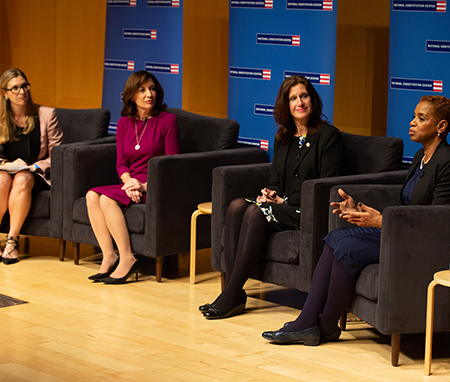In celebration of Juneteenth, Pulitzer Prize–winning historian David Levering Lewis, author of the definitive two-volume biography of W.E.B. Du Bois, explores Du Bois’ life, legacy, and enduring impact on American history, while also discussing his own new memoir, The Stained Glass Window. Jeffrey Rosen, president and CEO of the National Constitution Center, moderates.
Video
Podcast
Participants
David Levering Lewis is professor emeritus of history at New York University. A recipient of the National Humanities Medal, Lewis received the Pulitzer Prize for each volume of his W. E. B. Du Bois biography. He is the author of 11 books, including his new memoir, The Stained Glass Window: A Family History as the American Story, 1790–1958.
Jeffrey Rosen is the president and CEO of the National Constitution Center, a nonpartisan nonprofit organization devoted to educating the public about the U.S. Constitution. Rosen is also professor of law at The George Washington University Law School and a contributing editor of The Atlantic.
Additional Resources
- David Levering Lewis, The Stained Glass Window: A Family History as the American Story, 1790–1958, (2025)
- David Levering Lewis, W.E.B. Du Bois: A Biography 1868–1963, (2009)
- American Historical Association, “W.E.B. Du Bois (1868–1963): Historian, Sociologist, Editor, Activist,” Perspectives on History, (2023)
- W.E.B. Du Bois, The Talented Tenth, (1903)
- W.E.B. Du Bois, The Souls of Black Folk: Centennial Edition, (2003)
- W.E.B. Du Bois, Black Reconstruction in America: An Essay Toward a History of the Part Which Black Folk Played in the Attempt to Reconstruct Democracy in America, 1860–1880, (2014)
- W.E.B. Du Bois and Guy B. Johnson, Encyclopedia of the Negro: Preparatory Volume with Reference Lists and Reports, (1940)
- David Levering Lewis, W.E.B. Du Bois: The Fight for Equality and the American Century, 1919–1963, Read by Courtney B. Vance, (2001)
Excerpt from interview: David Levering Lewis reflects on the legacy and impact of Du Bois Black Reconstruction in America, noting how it challenged the Dunning School narrative by centering African American agency during Reconstruction. Although Du Bois was marginalized in later life due to his Marxist views, scholars ultimately embraced his antiracist vision.
David Levering Lewis: It is hard to believe that these students of Dunning, one by one, writing each one a state history, Alabama, Mississippi, Georgia, and so on, and they were uneven. Some, indeed, ignored the African Americans entirely. That was a mercy. Others would even concede that there had been some beneficence out of the experiment in that, say, public instruction was an idea that African Americans had introduced in their brief time in the state capitals, and a number of other institutional recommendations. But no, it was summed up, you might say, by an ambassador to Spain and Roosevelt's selection of a man who wrote Black Reconstruction. I am so sorry, but I cannot remember. It was now a selected book, compulsory reading, and he was a North Carolina gentleman of great distinction, and most of us grew up aware of the wonderfully indicting language of that book. However, there was always in the background what Du Bois had found and said, and there were young scholars like C. Vann Woodward, for example, and like others who said, well, this Du Bois really offers an alternate vision and a legitimate one.
And so by he himself, though by that time was unwelcome in much of his own country because he, like Paul Robeson, had offended the establishment by their Marxism. And so when he found himself at Berkeley during the time of his conviction, or rather his indictment as a Smith Act agent, as it were, when he found himself at Berkeley, he found that the professors could not perceive him on campus, but they went off campus to a Unitarian church. And there the students came and the professors came, and Du Bois was so struck by the phenomenon. And he said, but my goodness, why on earth? And they said, Dr. Du Bois, didn't you know that we teach you now in the academy? And that had been a welcome revelation to him. But I think by that time his criticism of capitalism was so solid, he thought, that he decided that capitalism cannot be reformed. And he said that in so many ways, that really the problem of the world would not be the color line. It will be rampaging capitalism, a kind of shark that cannot be restrained but for the total commitment of a citizenship that recognizes the dangers of maldistribution of wealth.
And it is that that finally causes him to be celebrated in Mao Zedong's China and Khrushchev's Russia. Of course, these are not exemplary experiments today for us. On the other hand, we probably are facing the excesses of kleptocracy and irrationality and unconstitutional behavior that may indeed, in a short order, really result in the chaos and resistance to the incumbent regime and perhaps a chance at making the constitutional center a point of concern and welcome that will have great importance in the days to come.
Full Transcript
View Transcript (PDF)
This transcript may not be in its final form, accuracy may vary, and it may be updated or revised in the future.
Stay Connected and Learn More
- Questions or comments about the show? Email us at [email protected]
- Continue the conversation by following us on social media @ConstitutionCtr.
- Sign up to receive Constitution Weekly, our email roundup of constitutional news and debate.
- Subscribe, rate, and review wherever you listen.
- Join us for an upcoming live program or watch recordings on YouTube.
- Support our important work.








